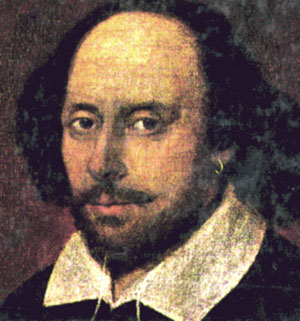

Acknowledgement: This work has been summarized using The Complete Works of
Shakespeare Updated Fourth Ed., Longman Addison-Wesley, ed. David
Bevington, 1997. Quotations are for the most part taken from that work, as
are paraphrases of his commentary.
Overall Impression: This is early Shakespeare and is interesting but lacks memorable lines and action.
Per Bevington: Written c. 1588-97 and drawing heavily on the style of John Lyly's courtly comedies of the 1580s (much punning, rhetorical devices, and word play), the court masque, and the conventions of Petrachan lyric poetry. This is apparently very early Shakespeare and seems much less humorous or profound and more tedious than many of his other works, with excessive dependence on word play. It depicts the war of the sexes well and portrays male characters which are consistently baffled and outmaneuvered by the women. [Not sure why "Labor's" so punctuated.]
Set in Navarre [in the Pyrenees at the modern France-Spain border]. The king of Navarre has resolved to engage with his disciples in a war "against your own affections"--"Navarre shall be the wonder of the world; Our court shall be a little academe." He persuades his attending Lords, the reluctant Berowne, Longaville, and Dumaine, to sign a pledge of scholarly pursuit and renunciation of wordly pleasures, particularly women.
Costard, a rustic and clown, and Dull, a constable, present to the king a letter from the "refined" pompous braggart, Don Adriano de Armado of Spain, who has fallen in love with Jaquenetta, a dairymaid. He is visiting the court, accompanied by his page Mote.
Armado has promised to study with the king for 3 years.
The Princess of France arrives with her attending ladies and her attending lords including Boyet. She has come on an embassy to persuade the king to give up his claim to Aquitaine [SW France], the financial details of which are not initially acceptable to the king. The king informs her that they must be housed outside the court gates because of his pledge. Berowne immediately is attracted to the dark-complexioned Rosaline, Dumaine to Katharine, and Longaville to Maria. The Princess sets immediately to plotting a "civil war of wits".
Letters are sent from Armado to Jaquenetta and from Berowne to Rosaline via Costard, but the clown mixes up the recipients.
Boyet reads Armado's letter to the amused Princess and her ladies while they are hunting.
Holofernes, a schoolmaster and pedant, and Nathaniel, a curate, discuss the hunt in a scholarly terms with much Latin. Jaquenetta asks Nathaniel to read the letter she has received, which proves to be from Berowne to Rosaline.
The king and his lords are busily and surreptitiously composing love sonnets to the new targets of their affections. Jaquentta arrives with Berowne's letter and gives it to the king. Berowne confesses his new interest and all four resolve to forsake their oaths once only in order to pursue their intended loves. They resolve to move into battle as as soldiers fighting for love.
Holofernes and Nathaniel engage in more pedantic word play. Armado has been commisioned by the king to make a presentation of a pageant to the Princess, and Holofernes advises Armado to base it on the Nine Worthies (a list which variably included Julius Caesar, Joshua, King David, King Arthur, Charlemagne, and Godfrey of Boulogne plus the five named below).
The Princess shows to her ladies the jewel she has received and other love tokens they have received from their new suitors, including letters which they critique. Boyet informs them that the men are planning on coming to them disguised as Russians. The women plan to receive them also masked and with the Princess and Rosaline switching disguised identities. The men arrive and are mocked and played with. The men leave and return as themselves, the women now also being out of disguise. The king wishes to lead the Princess to his court. But Rosaline implies the Russians were fools and the men are forced to confess their unsuccessful ruse and the king is teased for offering a favor to Rosaline when she was disguised like the Princess. Armado arrives. A presentation of five of the Nine Worthies is made with Armado serving as Hector of Troy, Costard as Pompey, Nathaniel as Alexander the Great, Mote as Hercules, and Holofernes as Judas Maccabaeus, all to the playful derision and teasing of the viewers. But suddenly Marcade arrives with news of the Princess' father's death. The playfulness comes to an end, the Princess must leave that same night. The king wishes to pursue the wooing, but the Princess chastises him for breaking his initial vow, and advises that he seek a lonely hermitage and live there remote from the world's pleasures for a year. If he completes this successfully, she will accept him. Katharine want Dumaine to wait a year also and to grow a beard in the interim, and Longaville is also to wait. Rosaline advises Berowne to spend a year visiting with the speechless sick and groaning wretches in a hospital. Armado has agreed to work at farming for 3 years in order to win Jaquenetta. The play ends with the finale that had been planned for the performance, a sung dialog between Spring (a time when the cuckoo mocks married men) and Winter (when the owl sings at night).